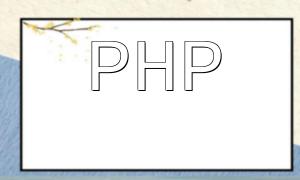The Importance of Data Collection and Tool Selection
Data collection is an essential technology in the internet era, helping us extract necessary information from web pages, APIs, and databases for analysis. PHP paired with regular expressions performs excellently in this field, being both efficient and flexible. This article will show you how to quickly implement data collection using PHP and regular expressions, along with practical code examples.
1. Preparing the Target Webpage
Before starting, we prepare a test webpage with the URL: http://www.example.com. The goal is to extract all links from this webpage.
2. Fetching Webpage Content Using PHP
Obtaining the HTML code of the webpage is the first step in data collection. PHP offers various methods for fetching pages, commonly using file_get_contents() or cURL. Below is an example demonstrating how to get webpage content with file_get_contents():
$url = "http://www.example.com";
$html = file_get_contents($url);
3. Extracting Links Using Regular Expressions
Next, use preg_match_all() with a regular expression to extract links from the webpage. The sample code is as follows:
$pattern = '/<a\s+href=["\'](.*?)["\'].*?>/i';
preg_match_all($pattern, $html, $matches);
$links = $matches[1];
Here, $pattern matches the href attribute in tags, $html is the webpage content, $matches stores all matching results, and the $links array holds all extracted links.
4. Filtering and Deduplication of Data
In real applications, the extracted links often need filtering and deduplication. The example below demonstrates simple filtering and removing duplicates:
$filtered_links = array_filter($links, function($link){
// Filtering logic: return true to keep the link
return true;
});
$unique_links = array_unique($filtered_links);
foreach ($unique_links as $link) {
// Save links to database or file here
}
5. Conclusion
This article introduced the basic process of data collection using PHP combined with regular expressions: webpage fetching, regex-based link extraction, and data filtering and deduplication. Mastering these techniques allows quick setup of simple and efficient data collection tools. Later, you can explore more complex scraping logic and diversified data processing to continuously improve your data collection skills.
Hope this article helps you in learning data collection. Keep exploring more practical techniques and methods!









